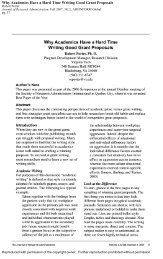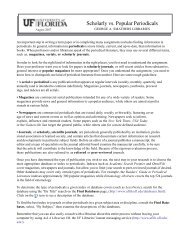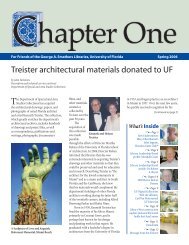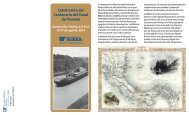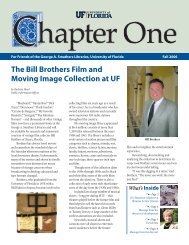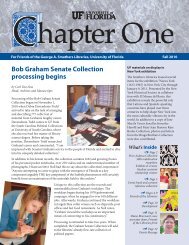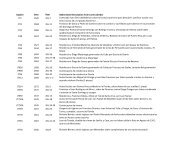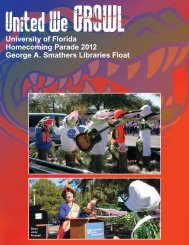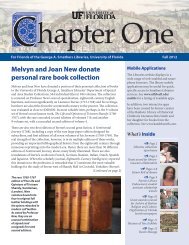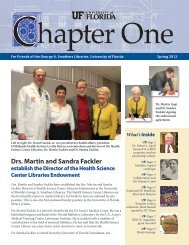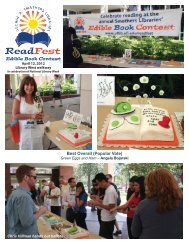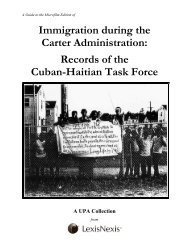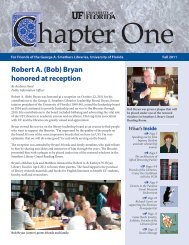Summer 2001 - George A. Smathers Libraries - University of Florida
Summer 2001 - George A. Smathers Libraries - University of Florida
Summer 2001 - George A. Smathers Libraries - University of Florida
You also want an ePaper? Increase the reach of your titles
YUMPU automatically turns print PDFs into web optimized ePapers that Google loves.
UF <strong>Libraries</strong> rescue Cuban National Archives (Continued from page 1)<br />
when traveling from Spain to<br />
America and back again. The<br />
volumes hold valuable clues to life in<br />
colonial Spain. From 1578 to 1900<br />
there were less than 20 notary families<br />
in Havana. The job was passed<br />
down from father to son. They started<br />
a new volume every year, keeping<br />
the old ones in the family. In 1900,<br />
the Cuban government collected the<br />
volumes for safe storage.<br />
“Beyond the preservation <strong>of</strong> the<br />
information contained in this<br />
global heritage, this project aims<br />
to link three centuries from the<br />
past with our present and<br />
future, and thereby help us<br />
better understand ourselves and<br />
our place in the rapidly changing<br />
world.”<br />
The result, says John Ingram,<br />
Director <strong>of</strong> Collections and principal<br />
administrator for the project, is a<br />
priceless archive <strong>of</strong> materials that<br />
many specialists regard as the single<br />
most important source <strong>of</strong> informa -<br />
tion on the New World’s Colonial<br />
history. This information is especial -<br />
ly relevant to <strong>Florida</strong> where notary<br />
archives were destroyed during the<br />
United States invasion <strong>of</strong> Spanish<br />
<strong>Florida</strong> in 1812.<br />
After two decades <strong>of</strong> interest, the<br />
university and the Cuban National<br />
Archives reached an agreement in<br />
March which will permit the documents<br />
to be micr<strong>of</strong>ilmed in Havana,<br />
and then scanned into digital format<br />
in <strong>Florida</strong>. Library staff will travel to<br />
Havana with a $50,000 camera and<br />
Page 2<br />
Chapter One<br />
John<br />
Ingram<br />
train Cuban archival staff during a<br />
12- to 18-month pilot program for<br />
the lengthy and painstaking process<br />
<strong>of</strong> transferring the entire collection<br />
to micr<strong>of</strong>ilm and digital formats.<br />
Cuban archives employees will<br />
assist in the pilot project, which<br />
is expected to cost more than<br />
$250,000. The university seeks to<br />
raise funds from private donors and<br />
foundations. No state or federal<br />
money will be used for the project.<br />
Ingram said he is confident that private<br />
foundations will fund the pilot<br />
project early next year. Plans call for<br />
indexing the records and making<br />
them available on the Internet to<br />
assist historians and genealogists to<br />
locate specific records.<br />
With the completion <strong>of</strong> a<br />
successful pilot program, and to<br />
make the larger effort possible, the<br />
UF <strong>Libraries</strong> seek to team up with<br />
U.S. and Spanish libraries and insti -<br />
tutions, in enlisting funding support<br />
for the entire project.<br />
Ingram and archivist Bruce<br />
Chappell have made several trips to<br />
Havana to negotiate the agreement.<br />
Ingram said, “I’ve seen some <strong>of</strong> the<br />
tomos (volumes), and some <strong>of</strong> them<br />
are in a condition I would liken to a<br />
very well-tatted piece <strong>of</strong> lace. There<br />
are many holes, and some paper is<br />
very fragile and could soon be lost<br />
entirely. There has also been insect<br />
damage and some water damage.”<br />
“I am convinced the Notary<br />
Protocols in Cuba’s archives will<br />
assume their rightful place <strong>of</strong> global<br />
importance for New World history<br />
and culture. For my colleagues in<br />
Latin American studies, these<br />
records will truly open a window in<br />
time,” Ingram further said. The<br />
information will be a significant<br />
addition to <strong>Smathers</strong> <strong>Libraries</strong>’ P.K.<br />
Yonge <strong>Florida</strong> History Collection.<br />
For more information about<br />
the project or to make funding<br />
inquiries, contact Dr. John Ingram,<br />
(352) 392-0342; email:<br />
jeingr@mail.uflib.ufl.edu. <br />
Dr. Berarda Salabarria, center, Director <strong>of</strong> Archivo Nacional de Cuba,<br />
signs the agreement to partner with the <strong>University</strong> <strong>of</strong> <strong>Florida</strong>. At left<br />
is Dr. Luis Frades, Vice Director; at right is Bruce Chappell, <strong>Smathers</strong><br />
<strong>Libraries</strong> archivist.



